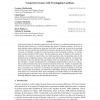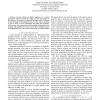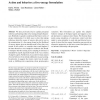666 search results - page 133 / 134 » Modeling Agents with a Theory of Mind |
JAIR
2010
13 years 6 months ago
2010
In the usual models of cooperative game theory, the outcome of a coalition formation process is either the grand coalition or a coalition structure that consists of disjoint coali...
ATAL
2007
Springer
14 years 1 months ago
2007
Springer
Decentralized Markov Decision Processes (DEC-MDPs) are a popular model of agent-coordination problems in domains with uncertainty and time constraints but very difficult to solve...
RTAS
2005
IEEE
14 years 1 months ago
2005
IEEE
— Convoy driving on public highways is a useful phenomena which increases the safety and the throughput of the highway. We present an approach through which a wireless Convoy Dri...
GECCO
2010
Springer
13 years 7 months ago
2010
Springer
This paper takes an economic approach to derive an evolutionary learning model based entirely on the endogenous employment of genetic operators in the service of self-interested a...
BC
2010
13 years 4 months ago
2010
We have previously tried to explain perceptual inference and learning under a free-energy principle that pursues Helmholtz's agenda to understand the brain in terms of energy ...



